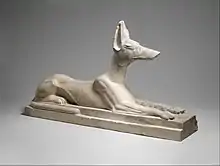Harry Smith (Egyptologist)
Henry Sidney "Harry" Smith, FBA (born 14 June 1928) is a British Egyptologist and academic, specialising in epigraphy and Egyptian archaeology. He held the Edwards Chair of Egyptology at University College London from 1970 to 1986. He had previously been a lecturer in Egyptology at the University of Cambridge, where he was also Budge Fellow in Egyptology at Christ's College, Cambridge.
Harry Smith | |
|---|---|
| Born | Henry Sidney Smith 14 June 1928 |
| Nationality | British |
| Citizenship | United Kingdom |
| Academic background | |
| Education | Merchant Taylors' School, Northwood |
| Alma mater | Christ's College, Cambridge |
| Academic work | |
| Discipline | Egyptology |
| Sub-discipline |
|
| Institutions |
|
Early life and education
Smith was born on 14 June 1928 to Sidney Smith, FBA, an Assyriologist and curator, and his wife Mary (nee Parker), an artist.[1][2] He was educated at Merchant Taylors' School, Northwood, an all-boys private school.[1] Between school and university, he undertook his national service.[3] Having won an Open Scholarship, he matriculated into Christ's College, Cambridge, in September 1949 to study classics.[3] He switched to Oriental Studies, specialising in Egyptology, Coptic and Arabic.[3] He graduated from the University of Cambridge with a starred first class Bachelor of Arts (BA) degree in 1953:[3][4] as per tradition, his BA was later promoted to a Master of Arts (MA Cantab) degree.[1] He then studied Demotic, a late Ancient Egyptian script, under Stephen Glanville.[4] He was awarded a Doctor of Letters (DLit) degree by the University of London in 1987.[1]
Academic career

From 1953 to 1953, Smith worked as an epigraphist on the Theban tombs, and was an assistant to W. B. Emery at his archaeological excavation at Saqqara.[5][4] He was appointed a lecturer in Egyptology at the University of Cambridge in 1954, and was elected Budge Fellow in Egyptology at Christ's College, Cambridge the following year.[6] He continued to assist at excavations in Egypt and Nubia, working at the Buhen fortress and Qasr Ibrim from 1959.[5] From 1959 to 1960, he was on leave from his university positions to undertake fieldwork: he gained his first archaeological excavation experience at Beycesultan, Turkey, under Seton Lloyd, before excavating at Buhen in Sudanese Nubia under W. B. Emery and at Nimrud in Iraq under David Oates.[3] In 1961, he directed the Egypt Exploration Society's archaeological survey of Egyptian Nubia in preparation for the Aswan Dam.[3][5][4] He then returned to Christ's College, Cambridge as a fellow, and was additionally a temporary tutor from 1961 to 1963.[3]
In 1963, he moved to University College, London (UCL), where he had been appointed Reader in Egyptian Archaeology.[1] He was additionally appointed an honorary curator of the Petrie Museum of Egyptian Archaeology, a position he held between 1963 and 1970.[6] From 1964 to 1965, he once more directed the EES's Egyptian Nubian Survey.[1] He was field director of the excavations at Saqqara's Sacred Animal Necropolis between 1964 and 1976.[5][4] In 1970, he was appointed to the Edwards Chair of Egyptology and head of UCL's Department of Egyptology.[1] He directed excavations at Saqqara and Memphis between 1970 and 1988.[1] He stepped down from the chair in 1986 and as head of department in 1988.[1] He was made Professor Emeritus of Egyptology by UCL in 1993, upon his retirement.[6][5]
Personal life
In 1961, Smith married Hazel Flory Leeper. His wife predeceased him, dying in 1991.
Honours
In 1985, Smith was elected a Fellow of the British Academy (FBA), the United Kingdom's national academy for the humanities and social sciences.[6]
Selected works
- Smith, Harry S. (1962). Preliminary Reports of the Egypt Exploration Society's Nubian Survey. Cairo: Government Print.
- Smith, Harry Sidney (1974). A visit to ancient Egypt: life at Memphis & Saqqara, c. 500-30 B.C. Aris & Phillips. ISBN 978-0856680243.
- Smith, Harry Sidney (1976). The Fortress of Buhen: the inscriptions. London: Egypt Exploration Society.
- Emery, W. B.; Millard, A.; Smith, H. S. (1976). The Fortress of Buhen: the archaeological report. London: Egypt Exploration Society.
- Smith, H. S.; Davies, Sue (2005). The Sacred Animal Necropolis at North Saqqara. The falcon complex and catacomb: the archaeological report. London: Egypt Exploration Society. ISBN 978-0856981654.
- Smith, H. S.; Davies, Sue; Frazer, K. J. (2006). The Sacred Animal Necropolis at North Saqqara. The main temple complex: the archaeological report. London: Egypt Exploration Society. ISBN 978-0856981708.
References
- "Smith, Prof. Henry Sidney". Who's Who 2019. Oxford University Press. 1 December 2018. doi:10.1093/ww/9780199540884.013.U35364. ISBN 978-0-19-954088-4. Retrieved 4 September 2019.
- "Assyriology at the British Museum: Dr. Sidney Smith, F.B.A". Nature. 162 (4121): 645. 1 October 1948. Bibcode:1948Natur.162R.645.. doi:10.1038/162645b0. ISSN 1476-4687.
- "Christ's Egyptology: Prof. Harry Smith". egyptology.christs.cam.ac.uk. Christ's College, Cambridge. Retrieved 24 June 2023.
- "The Lady Wallis Budge Fellowships in Egyptology". The Journal of Egyptian Archaeology. 63: 131–132. 1977. doi:10.2307/3856312. JSTOR 3856312.
- "Professor Harry Smith". Egypt Exploration Society. 19 July 2017. Retrieved 4 September 2019.
- "Professor Henry Smith FBA". The British Academy. Retrieved 4 September 2019.